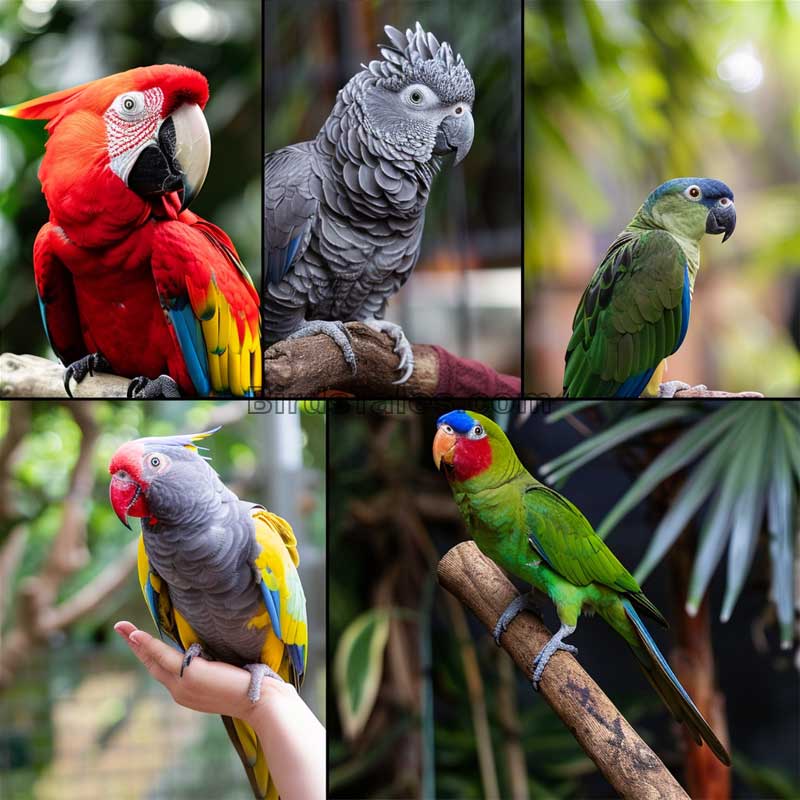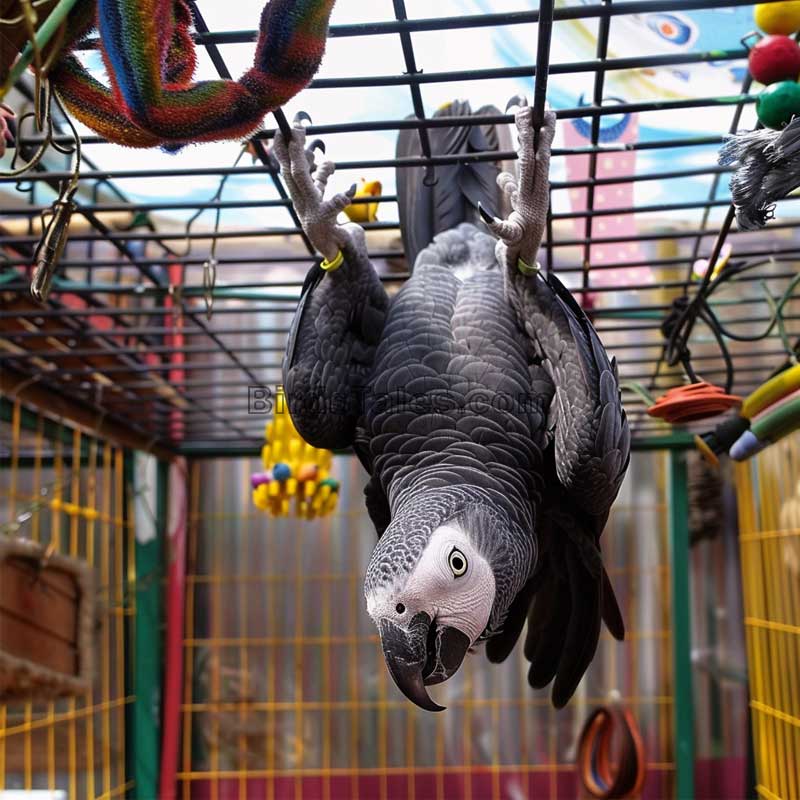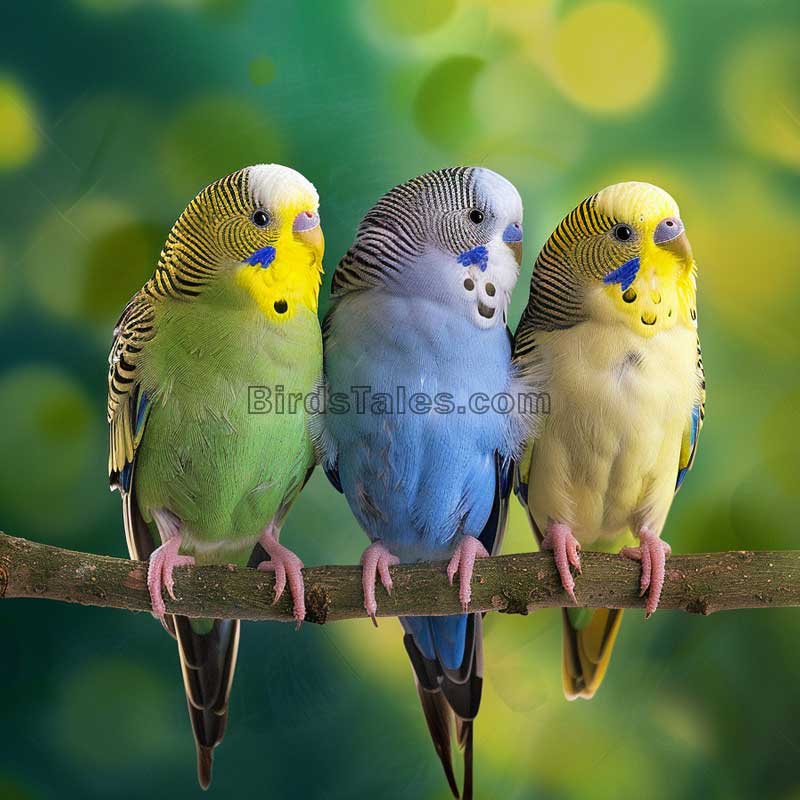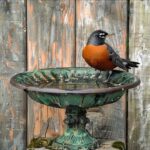Selecting the Right Parrot
Finding the right parrot isn’t just about picking the prettiest bird.
It’s about matching the bird’s needs with your lifestyle.
Parrots are not one-size-fits-all pets.
Different parrots have different behaviors and care requirements.
This section will help you understand what to consider when selecting a parrot that will fit well into your home and life.
Understanding Different Species
Parrots come in many shapes, sizes, and temperaments.
Choosing the right species is crucial.
Let’s break down a few popular ones:
- Budgies (Parakeets): These small birds are often the first choice for beginners. They are friendly, social, and relatively easy to care for. They love attention and can learn to mimic sounds, but their small size means they are less intimidating for first-time owners.
- Cockatiels: Slightly larger than budgies, cockatiels are gentle and affectionate. They are good with families and are known for their whistling ability. They enjoy interaction but can also be independent.
- Amazons: These medium-sized parrots are known for their playful nature and vibrant personalities. They are more demanding and can be quite loud. They thrive in households where they get lots of attention and interaction.
- Macaws: Macaws are large, colorful, and very social. They require a lot of space and time. Macaws can be very loud and demanding, making them suitable for experienced bird owners who can provide the necessary attention and care.
Each species has its unique quirks and needs.
Research is key.
Understand their lifespans, noise levels, and personalities to find the perfect match for your household.
Health Checks and Signs of a Healthy Parrot
Before bringing a parrot home, you need to ensure it’s in good health.
Here’s a detailed checklist to help you:
- Active Behavior: A healthy parrot is active and alert. It should move around its cage with ease and show curiosity about its surroundings. Lethargy can be a sign of illness.
- Clear Eyes: Check the eyes for brightness and clarity. There should be no discharge or cloudiness. Bright eyes are a good indicator of good health.
- Clean Feathers: The feathers should be smooth, shiny, and well-kept. Look for signs of molting, but avoid birds with bald patches or ragged feathers.
- Nasal Passages: The nostrils should be clean and free of discharge. Any signs of nasal discharge could indicate respiratory issues.
- Breathing: The parrot should breathe easily without wheezing or clicking sounds. Labored breathing can be a serious issue.
- Beak and Feet: The beak should be smooth and well-aligned, while the feet should be clean with well-formed toes and nails.
By ensuring these health markers are met, you’re setting yourself up for a good start with your new feathered friend.
Where to Acquire a Parrot
Knowing where to get your parrot is vital.
The right source ensures your bird is healthy, well-socialized, and ethically raised.
Here are your options:
Choosing a Reputable Breeder or Rescue

Finding a reputable breeder or rescue center is your best bet.
Here’s how to do it:
- Specialization: Look for breeders or rescues that specialize in parrots. They should have a deep understanding of the birds they care for. Avoid those who handle a wide variety of animals; they might not provide the specialized care parrots need.
- Transparency: A good breeder or rescue will be open about the bird’s health history and background. They should provide you with detailed information and be willing to answer all your questions.
- Reputation: Check reviews, ask for references, and visit the facility if possible. A reputable breeder or rescue will have a clean, well-maintained environment and happy, healthy birds.
Choosing a breeder or rescue that meets these standards ensures that you are bringing home a bird that has been well-cared for and properly socialized.
Risks of Pet Stores and Informal Sellers
Buying from pet stores or informal sellers can be tempting due to convenience and price, but it comes with significant risks:
- Health Problems: Birds from pet stores or informal sellers may not receive the same level of care as those from specialized breeders or rescues. They might be more prone to health issues due to poor breeding practices or inadequate care.
- Lack of Socialization: Parrots from these sources might not be well-socialized, leading to behavioral problems down the line. They may not be used to human interaction, making them harder to train and bond with.
- Ethical Concerns: Pet stores often source birds from large-scale breeders who may prioritize profit over the birds’ well-being. This can lead to unethical breeding practices and poor living conditions.
Avoid these risks by choosing a reputable breeder or rescue.
It might take more time and effort, but it’s worth it for a healthy, happy bird.
Understanding Parrot Requirements
Parrots are not like other pets.
They have specific needs that must be met to keep them healthy and happy.
Understanding these needs will help you decide if a parrot is right for you and ensure you provide the best care possible.
Assessing Space and Environment
Parrots need plenty of space to thrive.
Here’s what you need to consider:
- Cage Size: Parrots need a cage that is large enough for them to spread their wings and move around comfortably. For smaller parrots like budgies, a cage that is at least 18×18 inches is suitable. Larger parrots, like Macaws, need cages that are at least 36×24 inches.
- Shape and Design: Opt for a square or rectangular cage. These provide more usable space than round cages. Make sure the bars are strong and spaced appropriately for the size of your parrot.
- Placement: Place the cage in a quiet, but not isolated, area of your home. Avoid kitchens and drafty spots. Parrots need to feel part of the household without being in the thick of things.
- Play Area: Besides the cage, parrots need a safe area outside the cage to explore and play. This space should be free of hazards and provide various perches and toys.
A well-planned space ensures your parrot has a comfortable, safe environment to live in.
Parrot Lifespan and Commitment
Parrots have long lifespans, which means a long-term commitment.
Here’s what you should know:
- Lifespan: Different species have different lifespans. Budgies can live up to 15 years, while larger parrots like Macaws can live 50 years or more. This means a parrot could be with you for decades.
- Commitment: Owning a parrot is like having a child. They need daily interaction, a proper diet, and regular vet check-ups. You must be ready for the long haul.
- Routine Care: Parrots require a consistent routine. This includes feeding, cleaning the cage, and providing mental stimulation through toys and social interaction. This daily commitment is essential for their well-being.
Considering the long lifespan and commitment required, ensure you’re ready to provide a stable, loving home for many years.
Preparing Your Home for a Parrot
Before bringing a parrot home, proper preparation is essential.
This involves setting up a safe and enriching environment.

Cage Setup and Safety
Setting up the cage correctly is vital for your parrot’s health and safety:
- Size and Shape: As mentioned, choose a cage that is large enough and preferably square or rectangular. Ensure the cage is made of safe, non-toxic materials.
- Perches and Toys: Include a variety of perches of different sizes and materials to keep your parrot’s feet healthy. Provide plenty of toys to keep them mentally stimulated. Rotate toys regularly to prevent boredom.
- Food and Water Bowls: Place these in accessible locations within the cage. Clean them daily to prevent bacterial growth.
- Safety: Ensure all cage doors and latches are secure. Parrots are clever and can open simple locks. Check for any sharp edges or small gaps that could injure your bird.
A well-set-up cage provides a safe and comfortable home for your parrot.
Mental and Physical Stimulation
Parrots are intelligent and need plenty of stimulation to stay happy:
- Toys: Provide a variety of toys that challenge their mind and keep them active. Foraging toys, puzzle toys, and chew toys are excellent choices.
- Social Interaction: Spend time interacting with your parrot every day. Talk to them, teach them tricks, and allow them to perch on your hand. Parrots thrive on social interaction.
- Playtime: Allow your parrot to spend time outside the cage daily. This gives them the opportunity to stretch their wings and explore. Supervised playtime is important for their mental and physical health.
By providing mental and physical stimulation, you keep your parrot engaged and prevent behavioral issues.
Conclusion
Buying a parrot is a significant decision that requires careful thought and preparation.
Understanding the commitment involved, assessing space and environment needs, and preparing your home properly ensures a happy and healthy relationship with your new feathered friend.
By following these guidelines, you can make an informed decision and enjoy the rewarding experience of parrot ownership.



